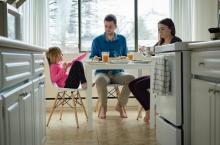Household
Home Sweet Home: The Reality of Housing in Bulgaria Revealed
New data from the National Statistical Institute (NSI) sheds light on the housing landscape in Bulgaria, painting a picture of the majority of Bulgarians residing in older homes.
Bulgaria: 85% of Population Reside in Owned Homes
In the latest Eurostat data disclosed on Thursday, it's been unveiled that a significant 85% of Bulgarians resided in households owning their homes in the year 2022, marking a slight increase from the preceding year's 84.9%. This statistic presents an intriguing aspect of the housing landscape in the country.
- Read more about Bulgaria: 85% of Population Reside in Owned Homes
- Log in to post comments
11.5% of Bulgarians do not have a Toilet in their Home
11.5% of inhabited dwellings in Bulgaria do not have an indoor toilet, 6.9% do not have a bathroom at home. 0.2% of dwellings in cities and 0.7% - in villages are without a source of water, according to data published today by the National Statistical Institute on housing conditions, collected during the fall 2021 census.
Households spend most on food, shows survey
The share of food and non-alcoholic beverages in households' overall expenditure was 22.8 percent, followed by housing and rent at 22.4 percent last year, a survey by the Turkish Statistical Institute (TÜİK) has shown.
Transport expenditure was the third largest expenditure item, with a share of 21.3 percent, according to TÜİK's Household Budget Survey.
- Read more about Households spend most on food, shows survey
- Log in to post comments
Average household size, total fertility rate for Türkiye decreases
According to the data of the Address Based Population Registration System (ABPRS), the average household size in Türkiye is decreasing, falling from four people in 2008 to 3.17 people in 2022, the Turkish Statistics Institute (TÜİK) has announced.
Some 27 percent of population ‘tenants’: TÜİK
The share of the Turkish population in rented houses was 27.2 percent in 2022, rising from 26.8 percent in the previous year, data from the Turkish Statistical Institute (TÜİK) have shown.
The share of the population living in their own dwelling declined from 57.5 percent in 2021 to 56.7 percent last year, according to TİUK's poverty and living conditions survey.
- Read more about Some 27 percent of population ‘tenants’: TÜİK
- Log in to post comments
Some 94 pct of households have internet access
Some 94 percent of households have internet access in 2022, up from 92 percent in the previous year, the Turkish Statistical Institute (TÜİK) said on Aug. 26.
In 2012, a little more than 47 percent of the household had access to the internet, while the figure rose to 80.7 percent in 2017.
- Read more about Some 94 pct of households have internet access
- Log in to post comments
Nearly Half of Bulgarians Live in Crammed Dwellings
A little over 41 percent of Bulgarians live in overcrowded dwellings, according to the latest data from the European statistical office Eurostat. This means that they do not have sufficient number of rooms for the size of their household.
Fewer families, more one-person households in past five years: Survey
The average household size in Turkey, which was 3.69 people in 2012, fell to 3.35 in 2019, a downward trend indicating the number of children families in the country were having was declining, according to statistics and the results of a life satisfaction survey carried out by the Turkish Statistical Institution (TÜİK).
Eurostat: 41.6% of the Bulgarians are Living in Overcrowded Households
In the European Union (EU), 17.1% of the population were living in overcrowded households in 2018, meaning they did not have enough rooms compared to the size of the household. Although merrier, overcrowded households can feel even smaller with kids playing in the same room as parents trying to telework during the coronavirus lockdown.










